Hospital flooring options are one of the most important aspects of a hospital building. They are the primary point of contact between patients and staff during a medical emergency. Those who have worked in standard hospitals for any period will tell you (that) some things are consistent about all healthcare facilities: their floors are always durable, antibacterial,slip-resistant, pollution resistant, and easy to clean.
Even the most pleasant and hospitable of environments can become quite unpleasant when the floors are not maintained. Considering this fact, you will want to look at various hospital flooring options and consider all possible factors.
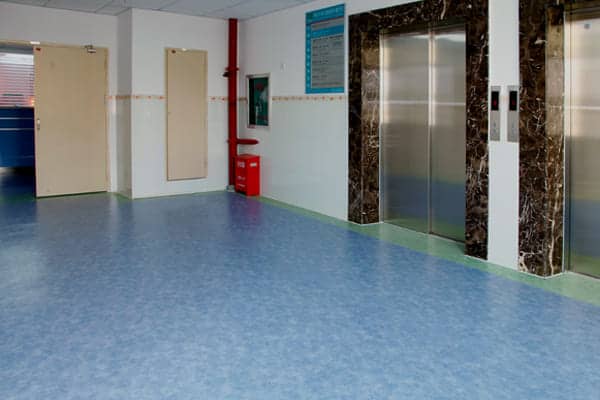
What are the factors for choosing a hospital flooring option?
There are many different types of hospital flooring options available. When selecting the best choice for your hospital, it’s essential to consider these factors:
Durability:
The first thing you need to consider when choosing your hospital flooring is how long it will last before needing replacement or repair. Many different types of flooring available today may look attractive but not provide long-lasting durability. Some types may even require more maintenance than others.
Aesthetic appeal:
Aesthetic appeal is another important consideration when choosing your hospital flooring. If you want something that will stand out from the rest of the building (perhaps because it has a particular pattern or color), you should consider sheet vinyl among other floors.
Cost:
It would help if you also found out how much it will cost to install a new or replace an existing flooring in your hospital. This factor is essential because it will determine whether you can afford and maintain it.
Safety:
Choosing the hospital flooring that is safe for visitors, patients, and staff members who use the facility frequently is also essential. For example, if children are in the hospital, it should be safe for them to walk on without getting hurt. You should also ensure no sharp edges or corners on any floor part.
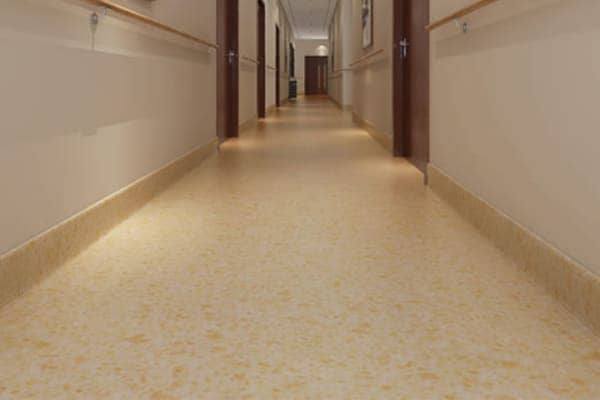
What are the types and characteristics of standard hospital flooring options?
There are various hospital flooring options: carpeting, wood, laminate, tile, and vinyl.
Carpet: Most hospitals like carpet because it is inexpensive and can easily install in many different hospital settings. Carpet is an excellent choice for most hospitals because it’s durable, fire-resistant, and doesn’t hold moisture like other types of flooring. Another advantage of using carpet as a hospital flooring option is that it tends to be quiet when walking on it, unlike other floors such as tiles or wood. This reason makes it ideal for use in patient rooms. In addition, patients tend to relax while sleeping or resting comfortably in their beds without any distractions caused by noise or movement around them whenever they are sleeping or resting.
Hardwood: The hardwood flooring option is also commonly used in hospitals. It is a healthy option because it minimizes the risk of foot traffic-related injuries and can be easily cleaned. It is also durable and will not absorb moisture, making it ideal for hospital environments. Hardwood floors are available in various species with many different patterns and colors to match any style of room or design scheme. Hardwood floors can come in any size or shape and can be installed on both sides of the room or just one side, depending on how much space you have available in your hospital setting.
Laminate floors are also trendy among hospitals because they offer durability and low maintenance costs compared to other options such as tile floors. However, laminate floors tend to be more expensive than tile floors. So if you decide on this option, make sure you work on your budget to avoid overspend on something that may not last as long as expected.
Tile: Tile is a good choice for open areas with high traffic or places where people are frequently walking on the floor. You can remove tiles from the floor quickly, so they don’t create Velcro-like traction issues when people walk on them. In addition, the tiles have a much more natural look than carpeting or hardwood.
Vinyl: Vinyl is commonly used for healthcare flooring, especially sheet vinyl. The sheet vinyl is an excellent option for any hospital because it is durable, affordable, and easy to maintain. In addition, the sheet vinyl provides a safe and secure environment for patients and staff members to walk on. Sheet vinyl is available in different colors and patterns so that you can choose the one that fits your hospital perfectly.
In addition, vinyl flooring products like vinyl composition tile vct, luxury vinyl tile lvt, vinyl roll sheet, and so on have many advantages over other types of floors, such as ceramic tiles, hardwood floors, and linoleum. The main advantage of vinyl is that it does not get scratched easily but still provides high durability for over ten years. In addition, the vinyl flooring can withstand heavy traffic without problems and prevent slips and falls from happening on it.
Another advantage of using vinyl products in hospitals is that you can clean them with ordinary household cleaners like shampoo and soap without adversely affecting their performance over time. You can also wipe off dirt with a damp cloth.
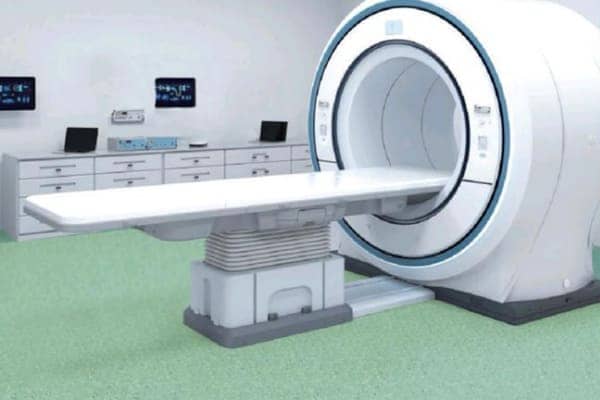
What option should you go for among all the floors?
When choosing the best flooring option for a hospital, we first need to consider the purpose of each section of the hospital. For example, if you have a department that requires high traffic and footfall, you should choose a flooring option that is effortless to clean and can withstand foot traffic. On the other hand, if you have departments that don’t require much footfall, you should consider the type of floor that is easy to maintain.
The Sections in a Hospital
Stations and treatment areas (Patient Room)
Stations and treatment areas are very different places from other rooms. They are where staff and patients meet most often. They are also where some patients spend the night, and they must be comfortable while they’re there.
If you want to ensure your staff and patients are comfortable in the hospital rooms, consider installing vinyl sheet flooring. Vinyl sheet flooring remains the best option because it provides a smooth surface that won’t cause any problems for patients with walking difficulties or other conditions.
You can install vinyl sheet flooring in patient rooms, including those used for patient recovery and rehabilitation. It’s also possible to install vinyl sheet flooring in hallways, hospital cafeterias, and other hospital facility areas where no different types of floors are available.
Additionally, it comes in a wide range of colors and patterns, so you can customize it to fit your needs and budget. Vinyl sheet flooring offers a variety of benefits over other types of flooring, including:
Low Maintenance: Because it’s a vinyl product, you only have to sweep or vacuum once per month to keep your vinyl floor clean and free from dust.
Easy Installation: Vinyl sheet floors are easy to install because they can be cut with a saw or rotary blade. They also come in many widths and lengths, so you can choose what best fits your space.
Wear Resistance: Vinyl sheet floor wears well under all conditions, meaning it will not delaminate when exposed to extreme temperatures or abrasions. When you walk on it, the flooring will not damage. The floor will not tear, and the vinyl flooring will not scratch. This feature makes vinyl sheet flooring popular in many industries, including hospitals.
Compression Resistance: The other advantage of using the vinyl sheet in hospitals is that it resists compression forces better than other materials such as carpet or tiles.
Sound Absorption: Vinyl sheet floor absorbs sound better than any other material on the market today because it is so thin and flexible that it conforms perfectly to all surfaces it touches. This feature makes it an ideal choice for rooms where noise levels are high or sensitive ears, such as operating theaters or intensive care units where patients need quiet surroundings during procedures.
Antibacterial: Vinyl sheet floor is resistant to bacteria and other microorganisms, so it helps prevent the spread of infection. It is the best floor, ideal for use in hospitals, where patients are often exposed to harmful bacteria on their skin or in their environment. In addition to preventing the spread of infection, vinyl sheeting also helps prevent bacterial growth within the hospital setting.
Stain Resistance: Vinyl sheeting is also resistant to stains and liquids. It is not damaged by accidents such as spills or splashes of water from machines or cleaning solutions used by caregivers or staff members who work at the hospital. The high water resistance means you can use vinyl sheeting in areas where water may be present (such as showers).
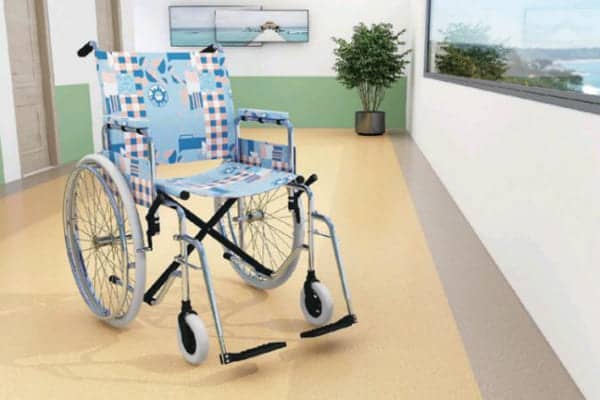
Another flooring option you can consider is Luxury Vinyl tile (LVT). LVT is also a good flooring option for hospital rooms. The material is made up of high-quality vinyl that has an attractive appearance and is resistant to water, stains, and dirt. LVT is also effortless to maintain. You can get rid of dust and dirt with just a vacuum and some cleaning solution. You can clean this flooring with a wet mop or even a wet vacuum cleaner without any problem.
Vinyl tile is available at teelandfloor.com in different finishes, such as custom and commercial series, making it easy to choose the right type for your room. It also comes in various sizes to choose the right one for your needs. If you want an attractive look with easy maintenance, you should go for luxury vinyl tile, as it perfectly meets all your requirements.
Hospital operation and emergency rooms
Hospital operation and emergency rooms are rooms with equipment for procedures, medications, and other supplies and hazards like paper cuts and blood spills. A good room flooring option can help reduce the risk of infection in these areas by reducing the number of bacteria that can spread through the air. There are many reasons why it’s essential to choose the flooring that is safe for hospitals, including reducing the risk of infection, improving comfort, and saving money. Remember, the main goal is to create a sterile environment where patients get treatment without fear of contamination by bacteria or viruses.
Vinyl Roll flooring is the best option you should consider for operation and emergency rooms. Vinyl roll flooring, also known as vinyl sheeting, is a thin sheet of vinyl that you can use in various applications. This flooring has been used in hospitals for many years because it provides a smooth surface for walking and working. In addition, it is durable, stress-free to clean, and offers protection from dust, dirt, and stains. Vinyl roll flooring also comes in many different colors and styles.
Homogenous Vinyl Sheet
The homogenous vinyl sheet is widely used in hospital operating rooms due to its features, such as wear resistance, antibacterial, anti-pollution, anti-static, sound absorption, etc. The use of a homogenous vinyl sheet in hospital operation rooms is beneficial for both patients and staff. Firstly, it can reduce the noise level in the operation room because it has high sound insulation ability; secondly, it can make your work more convenient by reducing the risk of falling; last but not least, using the homogenous vinyl sheet in hospital operation rooms will also improve the appearance of your office because this kind of material looks very beautiful and warm.
Vinyl Roll Flooring Benefits:
Vinyl roll flooring has many benefits, making it an ideal choice for hospitals and other healthcare facilities. For example, vinyl roll flooring has excellent sound deadening properties, reducing noise levels in the room. This feature helps eliminate distractions that can impair your facility’s quality of patient care.
Vinyl roll flooring is highly durable because it is made from solid materials like vinyl plastic sheeting and PVC profiles. In addition, these materials are resistant to moisture, mold, and mildew, making this flooring an excellent option for hospitals with a lot of humidity in the air.
Vinyl roll flooring offers excellent resistance to heat because it doesn’t trap heat like other types of floors, such as concrete or stone tiles. This feature also makes it an ideal option for operating rooms where patients are exposed to high temperatures during procedures such as surgeries or x-rays.
Vinyl roll flooring also has a low coefficient of friction, which means it is easy to clean and maintain. You can install vinyl roll flooring in rooms like locker rooms, waiting rooms, laboratories, corridors, and clinical areas.
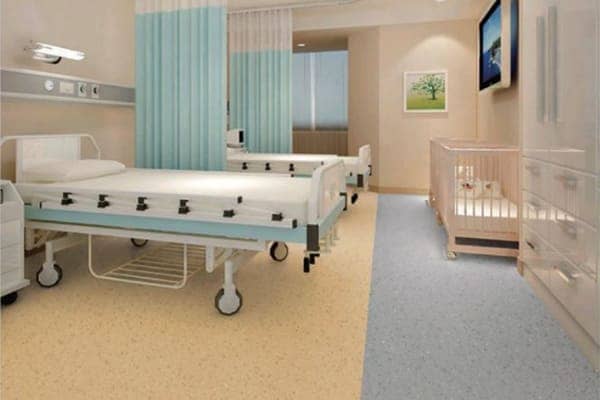
Nurse’s stations and treatment rooms (Hospital Staff Rooms)
Hospital staff rooms deserve the best flooring that is smooth or low texture. There are plenty of options available, but one of the most popular that is reliable remains vinyl flooring. Vinyl flooring has been around for decades and has proven to be one of the most durable and practical flooring options applicable to any hospital room.
Hospital Reception and Entrance
The most common flooring option for a hospital reception and entrance is tile. Tile is durable, long-lasting flooring that will withstand high traffic areas. It’s also easy to clean and maintain, which helps keep your entire hospital space looking great. Tile is also excellent for rooms with heavy foot traffic or patient care activities.
However, if you are considering getting tiles, it is advisable to get LVT. Because it’s durable and easy to clean, it offers long-lasting value. Plus, LVT is available in many colors and patterns, so you can easily match your decor.
LVT is made from thin sheets of plastic that have been bonded together with glue. They have an adhesive backing that allows them to stick to most surfaces. The surface of the LVT is smooth, but it isn’t glossy like some other types of flooring. It is advantageous if you want a light-colored floor that won’t reflect light into the room.
Where can you get the best hospital flooring option?
There are many places you can get any flooring option for your hospital. However, the first thing you need to do is to determine what kind of flooring you want. If you want something that will last ten years, we recommend ordering your flooring at Bantrofloor Industry.
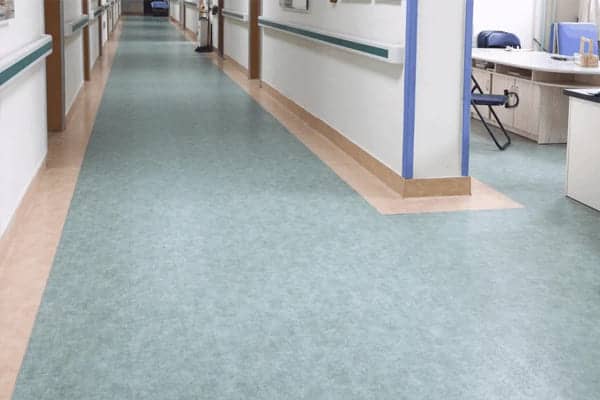
Why Bantrofloor?
Teelandfloor Industry offers the best solutions for your flooring needs. As a professional PVC vinyl flooring manufacturer in China, we provide a wide range of options for your flooring needs. We supply you with premium vinyl products like Vinyl Dense Bottom Floor, Vinyl Homogeneous Floor, Vinyl Foam Bottom Floor, and Custom PVC vinyl Floor. In addition, our expert installation team can help you bring your vision to reality by installing it in your facility. We are experienced in the flooring industry and only provide affordable products.
Our experienced team of experts is ever ready to help you with any questions you may have about our products or services.


